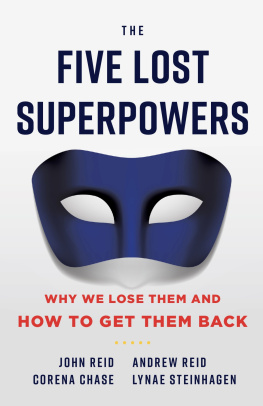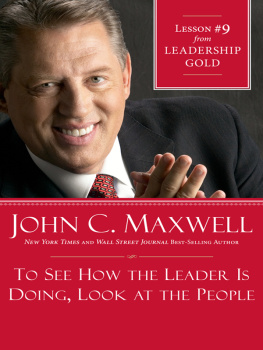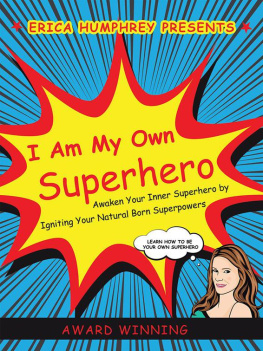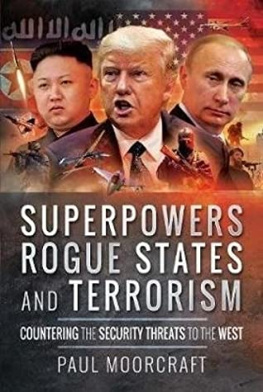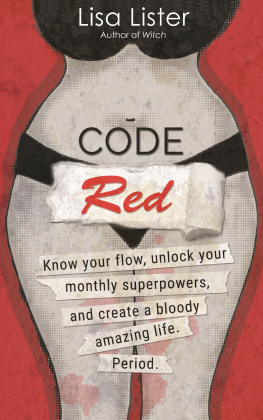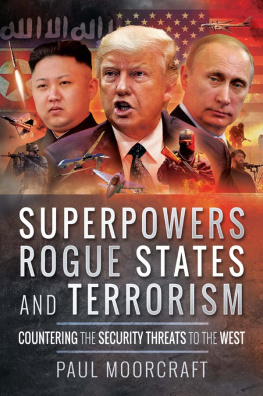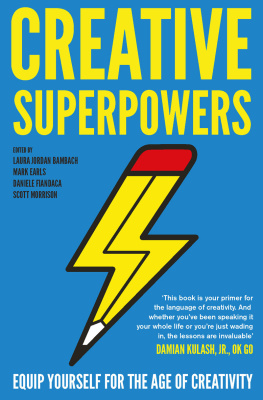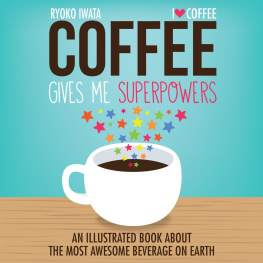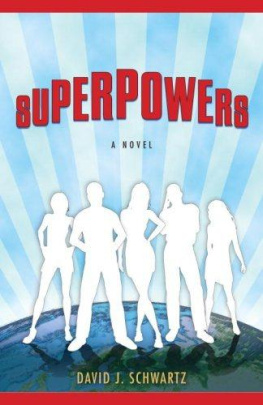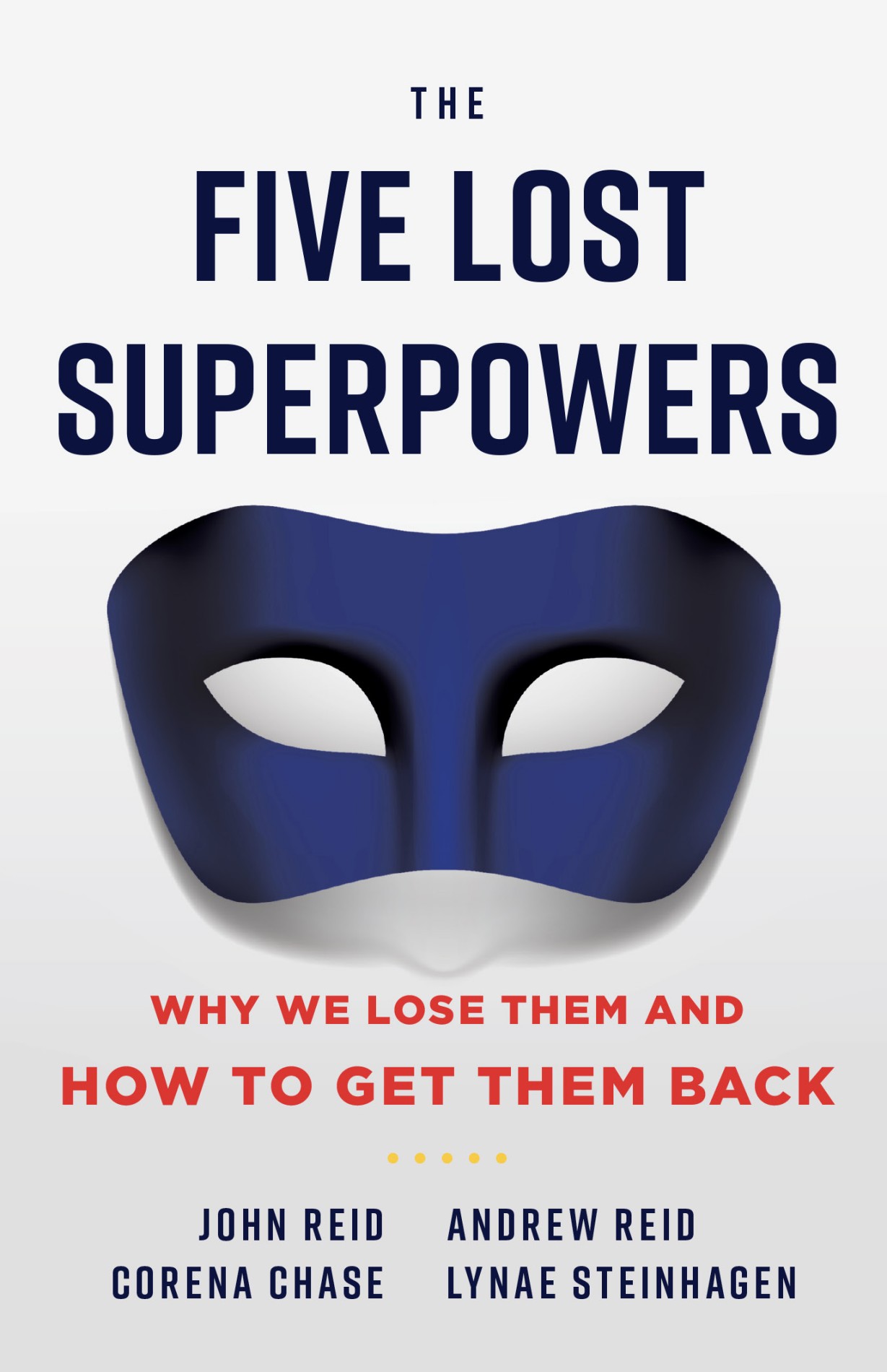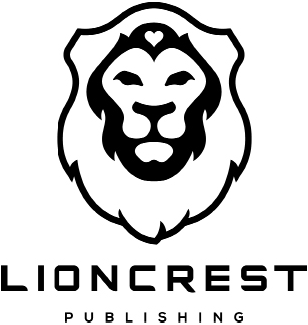Copyright 2021 John Reid, Andrew Reid, Corena Chase, Lynae Steinhagen
All rights reserved.
The Five Lost Superpowers
Why We Lose Them and How to Get Them Back
ISBN 978-1-5445-2294-4 Hardcover
978-1-5445-2292-0 Paperback
978-1-5445-2293-7 Ebook
This book is dedicated to the superheroes all around usthose who fight for justice, seek the truth, and take personal risks for the greater good.
Foreword
Ben hunches there, teetering on the top bar of the jungle gym. Although he and his brothers, Jacob and Christian, came to the playground alone, theyre now fully immersed in a universe of Dragons and Dinosaurs.
Ben, a Dragon, appears cornered. A few Dinosaurs are poised around and down the slide. To the right, near the monkey bars, another cluster of Dinosaurs are encouraging Ben to come their way so that they can capture him, as they have the other Dragons, who are languishing on the swings. Ben yells to his compatriots, Dont worry, I will rescue you!
It looks like if Ben can find a way to free the other Dragons, the game can continue. His grandfather, or any other observer over sixty years old with bad knees, couldnt anticipate Bens next move: he decides to jump down from the top of the jungle gym and make a run for the swings. Perhaps hes misjudged how hard the ground can be; he tumbles and, for a moment, sprawls on the dusty field. The looming Dinosaurs, shocked by the move, step back and freeze. Ben quickly brushes himself off and races to free the Dragons. The Dinosaurs, in hot pursuit, ultimately get the remaining Dragon.
After a short breather, theres a quick huddle about the next round and whether they should keep the same teams.
Later, Jacob and Christian join Ben and their grandfather, Pa, as they amble out of the playground. Pa tests his understanding of the game against his observations.
So. Its called Dragons and Dinosaurs.
Yep, Ben replies. I was a Dragon, and Jacob and Christian were Dinosaurs.
Actually, Jacob interrupts, I was a T-Rex, and Christian was a Microraptor. Dinosaurs are the best.
You know dinosaurs and dragons didnt ever really fight, right? Pa asks.
Of course they didnt. Dragons arent real, Jacob continues.
I think if they did coexist, the dragons would clearly have won, Pa insists.
No, Pa, dinosaurs are way bigger and tougher, Jacob and Christian say, almost in unison.
Ben quickly counters that dragons are far more clever and faster!
Dragons have magical powers! I think dragons would win, Pa says, voicing his opinion.
Pa, Jacob says with a touch of disappointment, no dragon could beat a T-Rex in a fight.
Ben, sensing Pa is in way over his head, shifts gears. What game did you play as a kid?
We played a game called Sardines.
How did it go? asks Ben.
One person is it and runs and hides. The other players count to sixty and then go looking for the person who is it. They do it by themselves. The first person who finds them...
... wins, Ben and Jacob say together.
No. He or she just quietly sits or lies next to them until everyone else eventually finds them.
Wow, that sounds boring. You would just lay there until the last person finds you? Why is it called Sardines? asks Jacob.
Sardines are a type of fish that come in a can, packed really close together.
Canned fish? Yuck! Dragons and dinosaurs are much better, Christian says, while Ben and Jacob nod in agreement.
I am that grandfather. Piqued by my grandsons questions, I did some research. Dragons do have superpowers: in Western culture, theyre able to breathe fire; in Eastern culture, they can control water, rainfall, hurricanes, and floods.
Children have superpowers of their own. These are key to helping them grow and adapt. Ben, Jacob, and Christian exhibited five of the many superpowers observed in children:
Playfulness (Dragons and Dinosaurs.)
Compassion (Dont worry, I will rescue you!)
Resilience (He brushes himself off and runs to free the others.)
Curiosity (Why is it called Sardines?)
Authenticity (Wow, that sounds boring.)
These superpowers burn bright in children. When we see children exercise these powers, we end up smiling and laughing and, invariably, telling other adults about it. We react like we have just seen lightning captured in a bottle, something rare, since we do not get to witness these powers in our day-to-day adult world.
As of this writing, the Marvel Cinematic Universe is the highest-grossing film franchise in history. Part of the attraction of its multiple superheroes is the dream possibility that wechildren of all agescould be one of them. That we, too, could save the day, defeat villains, and stand tall for truth and justice. That we would survive and ultimately prevail over villains slings and arrows. And while superheroes may possess superhuman abilities, most also possess important qualities available to virtually everyone.
The good news is while many adults may not exercise these powers, most of us havent abandoned them entirely. Much like Dorothy in Oz, whom Glinda told, Youve always had the power, we can still draw on these talents from within ourselves. The strategy to finding them, like locating a set of lost keys, begins with retracing our steps. By understanding when we last had them and where we lost them, we can reignite them.
We have gathered our own version of the Fantastic Four to reignite these superpowers. You will find that each author has their own voice, but we all have a passion for helping people be the best versions of themselves.
Our goalour hopefor ourselves and you is to make the case that these superpowers matter because they make us human (not super). The essence of our humanity is at the center of everything good in the working world and beyond. When were in touch with it, we can make great leaps in a single bound.
So, find your own Fortress of Solitude, and lets explore each of these five superpowers. Well examine how children demonstrate and express them, what happens to them as children move toward adulthood, their value, and, finally, what we can do to unleash them within ourselves.
.
.
The Wizard of Oz , directed by Richard Thorpe, Victor Fleming, and King Vidor (Culver City, CA: Metro-Goldwyn-Mayer, 1939).

